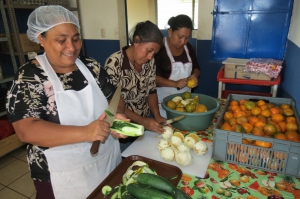Public purchases from family farming in Latin America and the Caribbean: an innovative policy to eliminate hunger
The programs of public purchases of food from family farming are ground-breaking and effective tools to eradicate hunger and stimulate local economies.

October 01, de 2015, Santiago, Chile – One of the newest mechanisms that is proving successful in the fight against hunger in Latin America and the Caribbean are the programs of public purchases of food from family farmers, as stated by FAO today.
A new publication by the FAO, Public purchases from family farming, and food and nutritional security in Latin America and the Caribbean, brings together lessons learned and successful experiences in various countries in the region, showing the effectiveness of this public policy; providing valuable information for other countries to replicate these practices.
According to the FAO, the programs of public purchases allow for the creation of a virtuous circle between family farming, the local markets, government assistance programs, and consumers; generating benefits for all.
“In recent years, these programs have become an integral part of the policies for food and nutritional security in the region, as they guarantee the right to food; improving the lives of the most vulnerable populations while promoting local development,” stated FAO Regional Representative, Raul Benitez.
In addition, the programs of public purchases promote better eating habits, create new markets for family farming and stimulate the coordination of public policies.
The book by the FAO shows that these purchase programs allow for increased social participation and diversification of food production; improving incomes and quality of life for smallholder farmers.
Moreover, the programs improve the diversity and quality of fresh food that the most vulnerable populations consume, providing healthy food for the children who participate in school feeding programs, public hospitals and similar institutions.
Procurement programs in Latin America and the Caribbean
The book, produced by the Brazil-FAO Cooperation Program, provides a comprehensive overview of the contributions of purchases from family farming as an efficient public policy for development.
Brazil and Uruguay currently have laws in place for public purchases from family farming; while other countries, such as Ecuador and Paraguay, have legal mechanisms which regulate the procurement process.
Brazil has two programs for public procurement from family farming: the Food Purchase Program (PAA, for its Portuguese acronym), which has been in place since 2003; along with the purchasing program of the National School Feeding Program (PNAE, for its acronym in Portuguese), implemented since 2009. Together, they benefit approximately 450 thousand family farmers per year, which amounts to an annual increase in resources worth USD 700 million dollars within that sector; providing healthy food to 65 million people.
In Ecuador, more than a thousand family farmers are participating, selling fresh fruit through a program of food purchases coordinated by the Institute of Food Supply. The amount invested in this sector with purchases was approximately USD 2.6 million dollars in 2014; which was unprecedented in the country.
In El Salvador, Guatemala, Nicaragua and Honduras, 127 farmer organizations participated in the program of “Purchase for Progress”, managed by the World Food Programme; working directly with more than 26 thousand farmers, obtaining procurement contracts for more than 28,000 tons of basic grains since 2009.
A way to reduce costs
Public purchases from family farming can lead to a reduction in the costs of meals bought by the government for their social assistance and school feeding programs, thanks to lower transport costs.
In a pilot project carried out in Paraguay, with the same budget, the coverage for school feeding increased from 4,500 meals to 7,000; just through purchases from family farmers.
Why purchase from family farming?
The study by the FAO analyzes structural aspects of supply and demand, institutional issues, agreements, legislation and models of management which guarantee efficiency, equity and transparency within these programs.
It also features ten lessons learned from the experiences that are already underway in Latin America and the Caribbean, which serve as guidelines for countries seeking to create or improve their own programs of public purchases.
- They are a mechanism to strengthen and guarantee the human right to adequate food.
- A policy to improve assistance for the most vulnerable populations.
- Promote local development and strengthen “short circuits” of marketing and selling produce.
- They contribute to building healthy eating habits.
- Allows for the opening of new markets for family farming.
- Legal frameworks and norms for purchases are more equitable.
- Promotes the coordination of public policies.
- They are a factor in expanding social participation.
- They give visibility to family farmers in society.
- Contribute to the diversification of food production.
